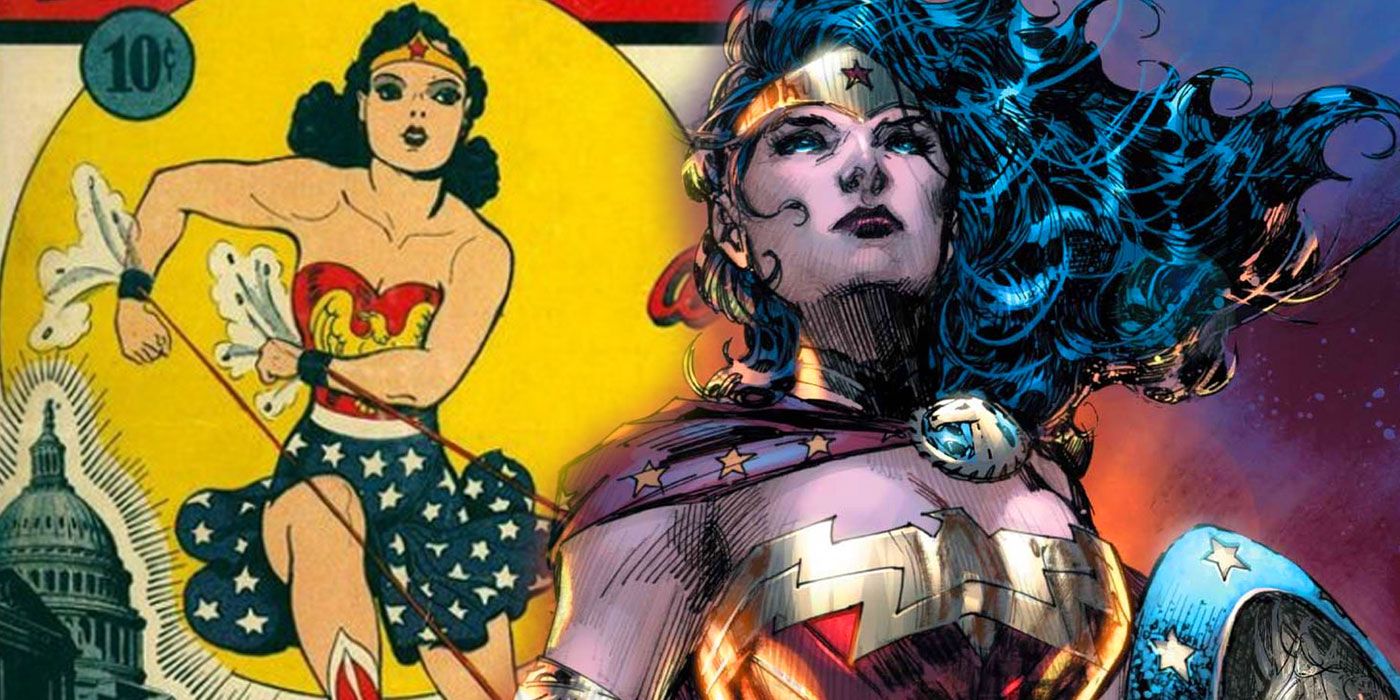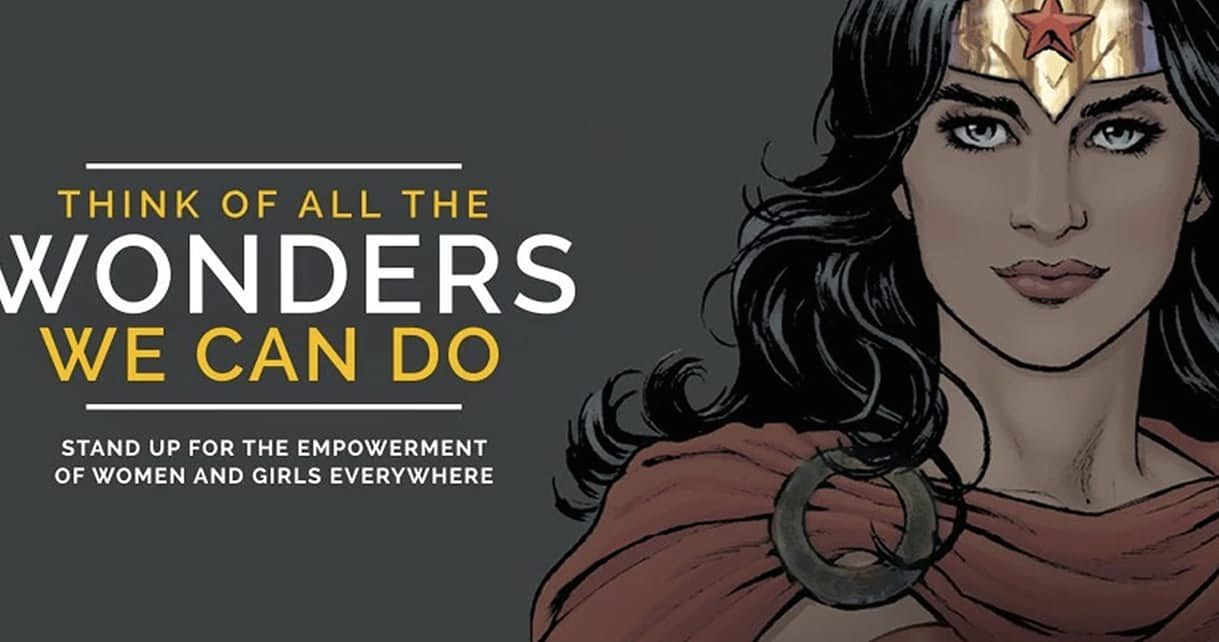This week marks Wonder Woman's 75th anniversary, and there have been celebrations galore, including the "Wonder Woman 75th Anniversary Special" #1 (out Wednesday), and a ceremony at the United Nations last Friday, where Wonder Woman was named Honorary Ambassador for the Empowerment of Women and Girls.
The appointment was not, however, without controversy. UN staff members launched an online petition in opposition to the event, claiming that a fictional "large breasted, white woman of impossible proportions, scantily clad in a shimmery, thigh-baring body suit with an American flag motif and knee high boots" was a poor choice to lead the fight for gender equality.
As of publication of this story, the petition had over 2,800 signatures.
Wonder Woman has a much bigger problem than people framing her as a sexualized pin-up girl draped in the American flag, however. She has a reputation for being -- dare I say it -- boring. Boring to the point that people have published lists of exactly why she is boring, with complaints centering on a boring supporting cast, boring villains, boring weapons and overall boring stories.
In the era of Ms. Marvel, Maps Mizoguchi, America Chavez and Faith, do we even need boring old Wonder Woman anymore?
The answer is a simple one: Yes. We need Wonder Woman just as much today as we did in 1941. Although at first glance she might feel like a throwback, with connotations of second-wave feminism, she remains genuinely radical, and it is precisely that radicalness that makes her unique in superhero comics.
In a genre defined by violence, Wonder Woman is, at heart, a pacifist. Her earliest adventures literally pitted her against War, personified in the form of the Greek god Ares. Diana's lasso of truth might seem a puny weapon, but that's precisely the point: it is meant to enlighten, rather than harm. Truth wins out over War and Deception.
Wonder Woman's pacifism is practically unique in the world of superhero comics. Batman, for instance, might eschew guns, but he still solves most of his problems through violence. Not Diana; though she is one of the greatest warriors on the planet, she sees fighting as a last resort and will do everything in her power to avoid it. Perhaps the only other hero who comes close to this level of dedication to nonviolence is Squirrel Girl, though Doreen does take a certain pride in her ability to "kick butts and eat nuts" that Diana would not. Wonder Woman's pacifism might sometimes feel hopelessly idealistic and constantly compromised, but it pushes us to imagine what the world (and superhero comics) could be, rather than what it is now.
Her pacifism isn't the only way Wonder Woman is radical. She's also the most prominent queer character in the history of comics (even if her queerness was until recently always subtextual), with an origin that could not be more queer. Diana comes from a society without men, where women live their lives and fall in love without feeling the crushing pressure to conform to gender norms. Themyscira is a post-gender society, and Diana serves as its ambassador in man's world. Let me say that again: Wonder Woman is literally an ambassador of queerness. That may actually be a cooler (and more timely) job than superhero.
Wonder Woman is also an incredibly powerful ambassador of queerness because of the circumstances behind her development. William Moulton Marston, was a psychologist who believed comics had the potential to reshape America's youth for the better. Working with his wife, Elizabeth Holloway Marston, he created a hero that was the epitome of their radically queer feminism. His sadomasochism was an open secret for years, but less well-known was that the Marstons were in a polyamorous relationship with another woman, Olive Byrne. The trio raised their children together, and Olive and Elizabeth lived together for decades after William's death. This relationship -- so interesting they're getting their own biopic -- as well as Marston's feminism that at times bordered on female suprematism, was infused into early Wonder Woman stories.
Much of the Silver and Bronze Age blandness was caused by later creators doing their best to ignore the obvious: Diana is queer as hell, no matter what the Comics Code might have had to say about the matter. With Millennials coming out of the closet in record numbers, now's the perfect time for her to take up the mantle of queer ambassador.
With Wonder Woman's queer edge dulled, many of her stories over the decades were bland, forgettable and even boring. The same is true of every superhero, of course; even Batman had some rough years. But, when handled by the right creative team, Wonder Woman's stories can be genuinely transcendent. George Perez, Greg Rucka, Gail Simone, Renae De Liz and a host of others have told amazing stories that are among the best comics available, period.
A big part of the problem? Wonder Woman has all-too-often in her 75 year history been assigned to creative teams that don't know what to do with her. Not coincidentally, she has been written and drawn almost exclusively by men. With the exception of some uncredited stories scripted by Dorothy Woolfolk in the 1940s, it took 44 years for a woman (Mindy Newell) to write "Wonder Woman", and 45 years for a female artist (Trina Robbins) to draw her. Before Gail Simone's 2008-2010 run, fewer than 10 issues of "Wonder Woman" had been credited to female writers. That's more than 65 years of stories about a woman raised in a society of women that were written and drawn by men, with barely any input from women.
That isn't to say that men cannot write or draw good Wonder Woman stories; one need only look at Greg Rucka's stellar work on the title to know that's not true. But the cumulative effect has been the perception that Diana is a sexy pin-up girl with a veneer of feminism and that female readers should probably look elsewhere.
But while more recent creations like America Chavez can be effortlessly infused with intersectional feminism without being weighed down by decades of continuity, Wonder Woman has a cultural cachet that cannot be beat. Everyone knows Wonder Woman, even if they've never read one of her comics or seen an episode of her TV show. She's on stamps, has a nearly unending line of merch, and will soon be taking over your local multiplex. She's a freaking UN Honorary Ambassador. That's a platform anyone else -- superhero or otherwise -- would kill for.
So, yes, we still need Wonder Woman. We need her to use her platform and her celebrity to push for peace. We need her to stand with pride as queer, feminist woman who won't let man's world drag her down. When faced with real world demagogues and violence, we need Wonder Woman more than ever to show us the best image of what we can be.
Here's to her next 75 years.
"Wonder Woman 75th Anniversary Special" #1 arrives in stores on October 26.


